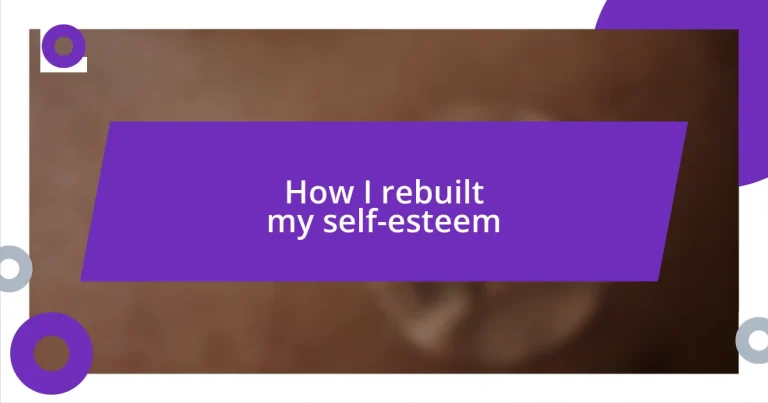Key takeaways:
- Self-esteem issues often arise from external validation and societal pressures, highlighting the importance of internal self-worth and reflection.
- Identifying personal triggers, setting realistic goals, and practicing self-compassion are essential strategies for rebuilding and maintaining self-esteem.
- Building supportive relationships and developing positive affirmations enhance self-esteem and foster a sense of belonging and resilience.
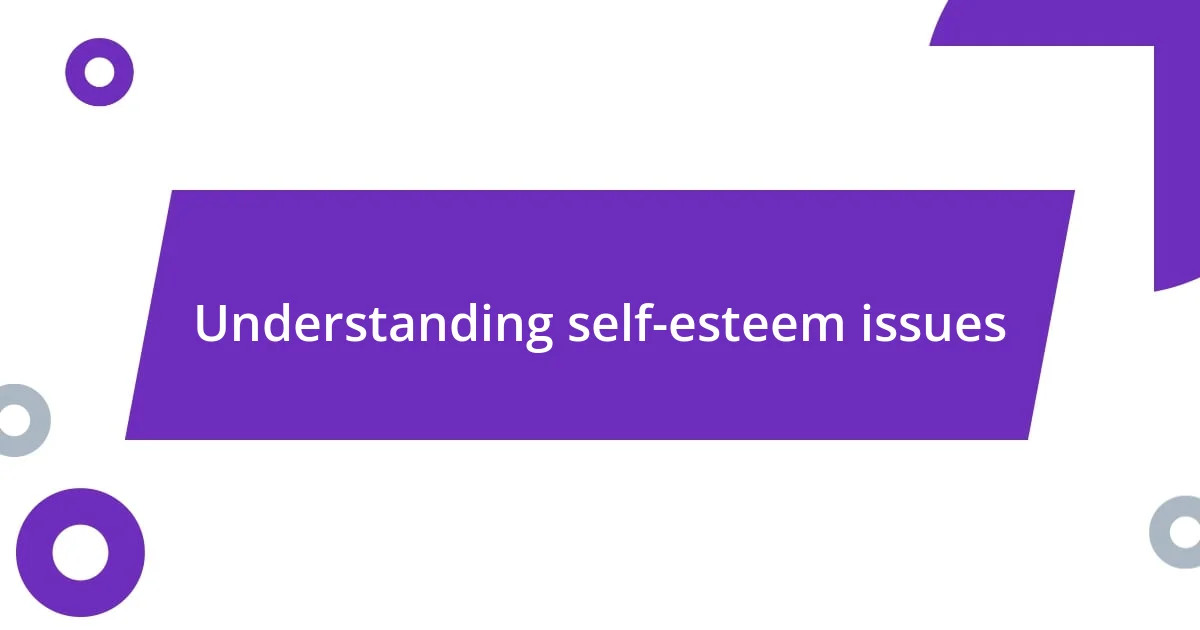
Understanding self-esteem issues
It’s fascinating how many of us struggle with self-esteem, often without realizing it. I remember a time when I walked into a room and immediately felt smaller, as if everyone could sense my insecurities. It begs the question—how often do we measure our worth based on the opinions of others rather than our own beliefs?
Understanding self-esteem issues means recognizing that they can stem from various sources, including childhood experiences and societal pressures. Reflecting on my past, I recall moments where a simple word or gesture from someone I looked up to could either lift my spirits or shatter my confidence in an instant. Why do we give so much power to external validation, despite knowing that our self-worth should ultimately come from within?
Additionally, self-esteem is not a static trait; it fluctuates with our experiences and mindset. I’ve seen how the smallest triumphs can significantly boost my confidence, while setbacks can lead to self-doubt. Have you ever felt that lift after achieving a goal, however minor it may seem? It’s a reminder that rebuilding self-esteem often requires continuous nurturing and self-reflection.

Identifying personal triggers
Identifying personal triggers is a crucial step in rebuilding self-esteem. I remember sitting at my desk one day, overwhelmed by an email from a colleague that seemed critical instead of constructive. It made me realize that negative feedback, even if intended to help, could send me spiraling into self-doubt. Recognizing these moments of discomfort helps me understand what specifically impacts my confidence.
Through my journey, I learned to pinpoint situations that provoke those feelings of insecurity. A loud room filled with confident people can trigger my anxiety, making me feel inadequate. There’s a sense of relief in acknowledging these triggers; it empowers me to navigate my environment with more awareness and intention.
Knowing my triggers doesn’t just support my self-esteem; it also fosters personal growth. For instance, I’ve started to approach situations that once intimidated me, like networking events, with a different mindset. Instead of fearing judgment, I now focus on the valuable connections to be made, transforming my anxiety into curiosity. This shift enables me to expand my comfort zone steadily.
| Trigger Type | Response |
|---|---|
| Critical feedback | Self-doubt and anxiety |
| Crowded social settings | Feeling small and invisible |
| Comparative successes | Jealousy and inadequacy |
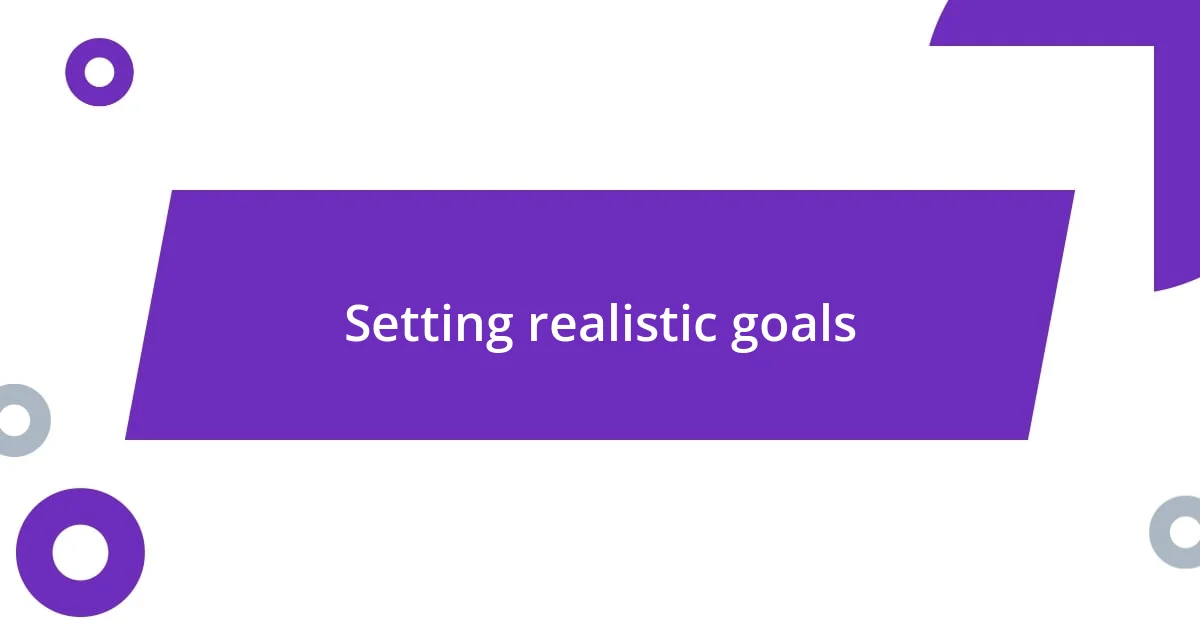
Setting realistic goals
Setting realistic goals is a cornerstone in the journey of rebuilding self-esteem. I vividly recall the pressure I felt when I aimed for lofty achievements without considering my current capabilities. One time, I set a goal to speak confidently in front of a large group, but my anxiety got the best of me—until I realized the importance of breaking that goal down into manageable steps. For me, it became about starting small, like initiating conversations with one or two people at a gathering, which ultimately built my confidence over time.
Here are some key points I’ve learned about setting realistic goals:
- Be Specific: Define what you want to achieve in clear and precise terms. Rather than saying “I want to be more confident,” say, “I want to speak up once in each meeting.”
- Set Measurable Outcomes: Ensure you can track your progress. For instance, instead of “I want to exercise more,” aim for “I will take a 30-minute walk three times a week.”
- Consider Your Limits: Acknowledge your starting point. If public speaking terrifies you, don’t aim for a TED Talk right away. Start with small group discussions.
- Celebrate Small Wins: Each step forward, no matter how tiny, deserves recognition. This could be as simple as rewarding yourself for the effort.
- Be Flexible: Life can throw curveballs. If a goal feels overwhelming, adjust it instead of abandoning it completely.
By setting realistic goals, I learned that each accomplishment adds up, gradually boosting my confidence and shifting my self-image to a more positive one. It’s about progress over perfection, and that’s a lesson I cherish deeply.
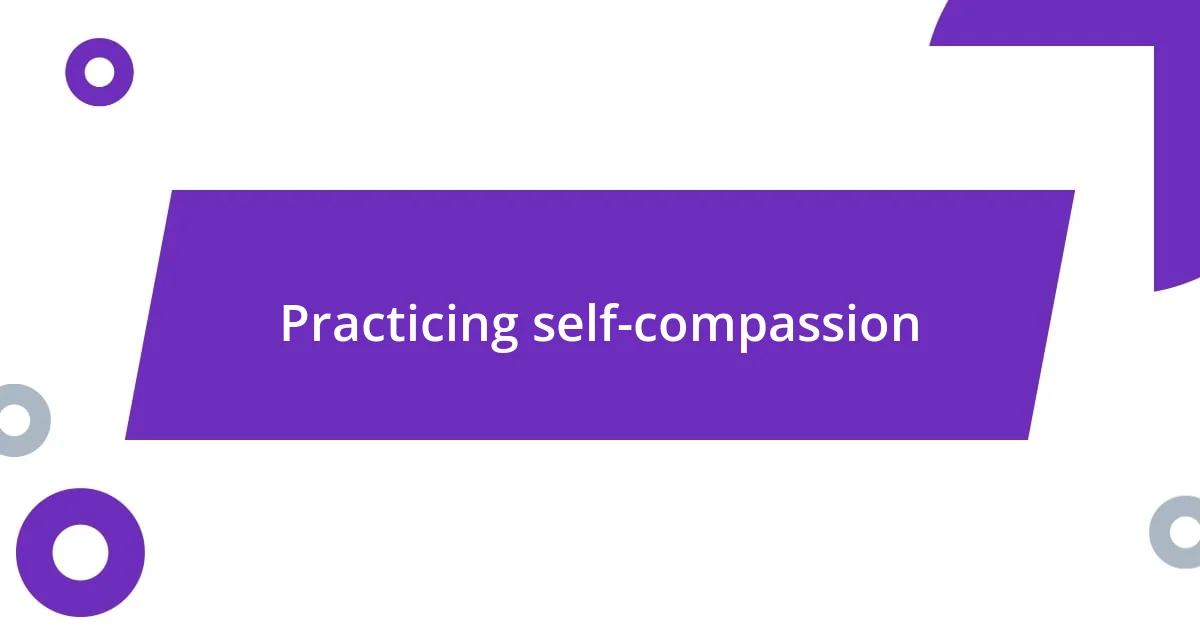
Practicing self-compassion
Practicing self-compassion has been a transformative aspect of my journey to rebuild self-esteem. I remember a particularly tough day when I failed to meet a personal deadline for a project. Instead of spiraling into self-criticism, I paused and treated myself with kindness. “Would I talk to a friend this way?” I asked myself. That simple question reminded me that everyone stumbles, and it’s okay to extend the same understanding to myself.
I’ve found that self-compassion is about recognizing my feelings without judgment. When I face disappointment, instead of berating myself, I take a moment to acknowledge my emotions. It’s like giving myself a mental hug. On days when I struggle, I remind myself that self-compassion isn’t a luxury; it’s a necessity. This practice allows me to move through difficult emotions without getting stuck in self-doubt, freeing me to approach challenges with a fresh perspective.
As I delve deeper into self-compassion, I’ve learned the power of positive affirmations. Simple phrases like “I am enough” or “I deserve kindness” may seem trivial, but they resonate with me on profound levels. One evening, I repeated these affirmations after a challenging day at work. It felt almost foreign at first, yet the reassurance gradually softened my critical inner voice. Developing this habit has enriched my understanding of myself, fostering resilience that I had previously thought was out of reach.
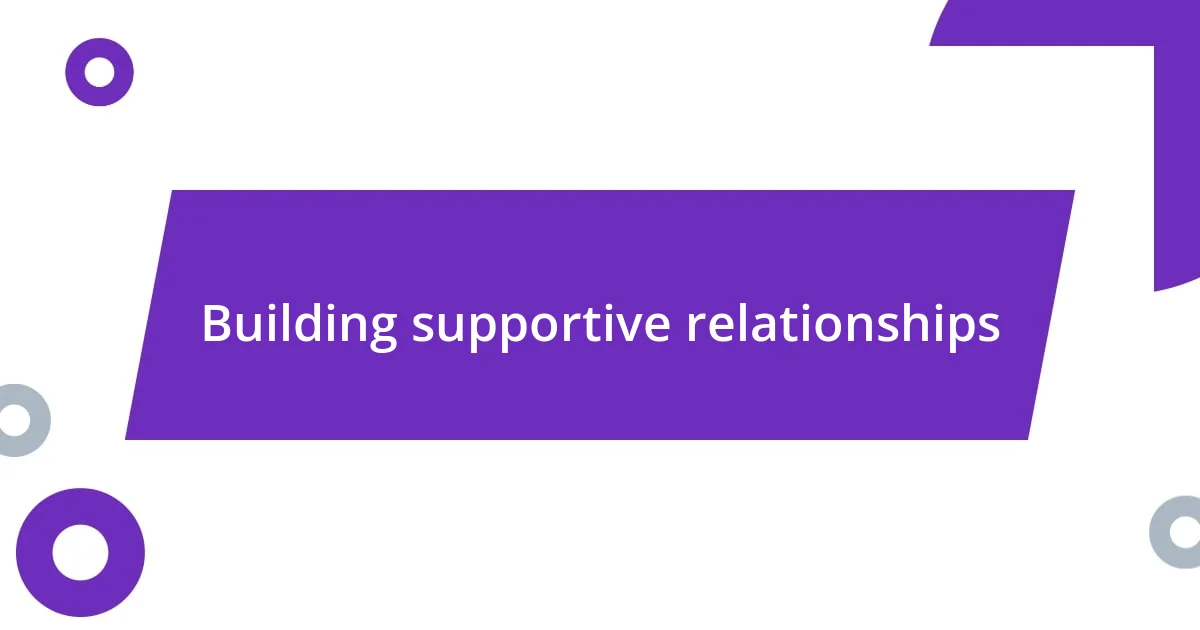
Building supportive relationships
Building supportive relationships has been a game changer in my self-esteem journey. I remember a time when I surrounded myself with people who didn’t uplift me. One friendship, in particular, felt more draining than energizing, leaving me questioning my worth. When I made the tough decision to distance myself from that relationship, it was as if a weight lifted off my shoulders; suddenly, I had the space to seek out connections that fostered positivity. Aren’t we all worthy of support that encourages our growth?
I also discovered the importance of being intentional about who I invest my time in. For example, I started attending a local book club, and it turned out to be a delightful experience. Engaging in deep discussions with like-minded individuals not only enriched my social life but also reminded me of my insights and perspective. Hasn’t anyone else found joy in just being heard and appreciated? My self-esteem flourished in that environment, where curiosity was celebrated, and every opinion mattered.
Moreover, I learned that nurturing supportive relationships is a two-way street. It’s not just about what I get but what I give. When I actively listen and offer encouragement to others, I feel a profound sense of fulfillment. A moment that stands out is when a close friend was dealing with a tough breakup, and I offered my time and understanding. I realized that being there for someone else also reinforced my belief in my ability to connect meaningfully. Doesn’t it make sense that the energy we invest in nourishing relationships can circle back, uplifting both ourselves and those around us?

Developing positive affirmations
Developing positive affirmations has been a unique experience for me. I recall sitting in my room, feeling completely overwhelmed by negative thoughts, when I decided to write down affirmations. At first, it felt silly to declare to myself, “I am worthy” while staring at my reflection. Yet, I soon found that this simple act began to change my mindset, gradually shifting how I viewed my capabilities. Have you ever noticed how a little encouragement can make a world of difference?
I believe that crafting affirmations requires personalization. I still remember when I tailored my affirmations to reflect my dreams and aspirations. For instance, on days when I faced self-doubt, repeating “I embrace my unique journey” reminded me to celebrate my individuality. This practice became a safe space for me to envision my growth, reminding me that self-belief is a journey, not a destination. Isn’t it fascinating how our internal dialogue can shape our self-perception?
The emotional resonance of affirmations caught me by surprise. One morning, after a sleepless night filled with worry, I stumbled upon a sticky note I had placed on my mirror: “I am resilient.” Just reading it sparked a warmth inside me, as if a light flickered back to life. Recognizing this emotional connection, I began incorporating affirmations into my daily routines. They transformed from mere statements to powerful reminders that I could overcome challenges. Isn’t it incredible how our thoughts can pave the way for our resilience?
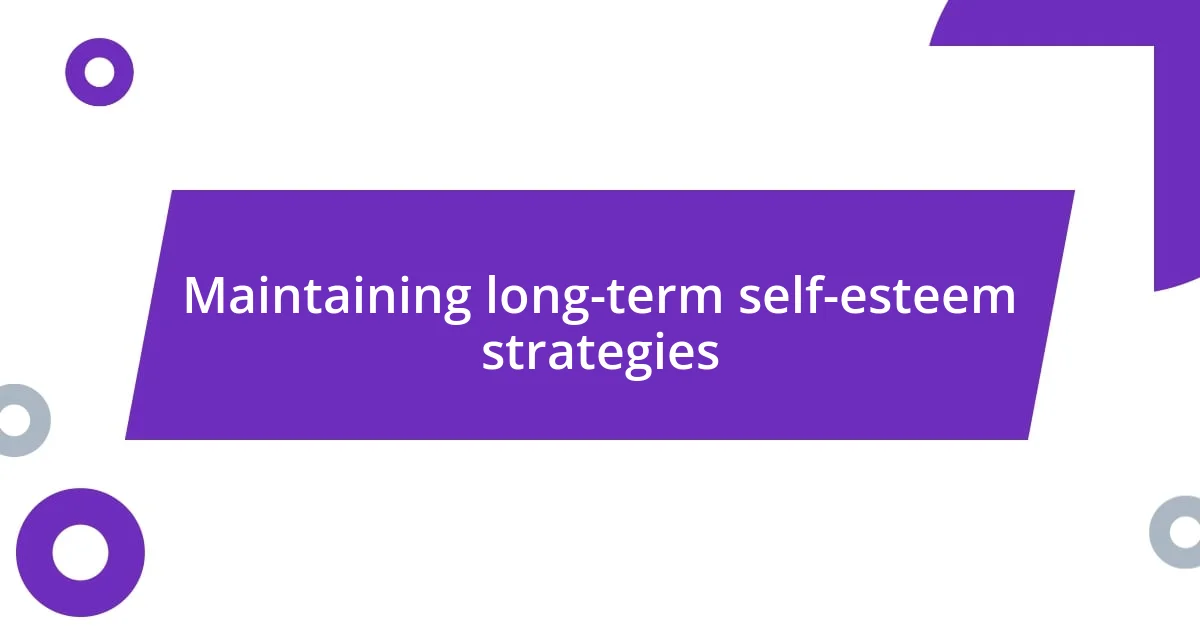
Maintaining long-term self-esteem strategies
One of the key strategies I’ve found essential for maintaining long-term self-esteem is practicing gratitude. Each morning, I jot down three things I’m grateful for. It may seem trivial, but even on tough days, this simple habit shifts my focus from what’s lacking to what’s abundant in my life. Have you ever noticed how gratitude can transform the mundane into something precious? I remember the day I wrote about my morning coffee’s warmth—suddenly, that simple ritual became a source of comfort and joy.
Another approach that has reinforced my self-esteem over time involves setting achievable goals. I recall a period when I felt lost and unaccomplished, so I decided to break my aspirations into small, manageable tasks. Celebrating these incremental achievements, like completing a workout or finishing a book, created a powerful ripple effect. Isn’t it motivating to see our progress, no matter how small? With each completed goal, I found a renewed sense of competence that gradually shaped a more positive self-image.
Finally, I believe regular self-reflection plays a crucial role in sustaining self-esteem. I often take moments throughout the week to ask myself reflective questions, such as, “What challenges did I overcome?” or “How did I show kindness to myself?” This practice doesn’t just boost my confidence; it deepens my self-awareness. I remember a week when I felt particularly proud after overcoming my fear of public speaking—all because I reflected on my growth. Have you ever paused to acknowledge your journey? It truly highlights our resilience and helps solidify our sense of worth, reinforcing that every step forward is a victory in itself.












